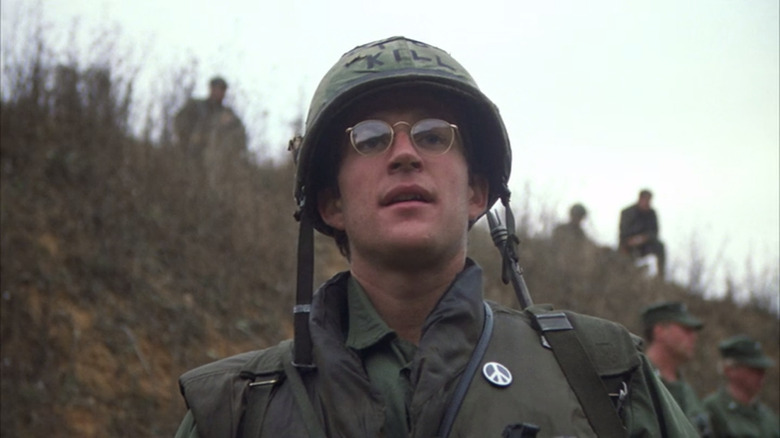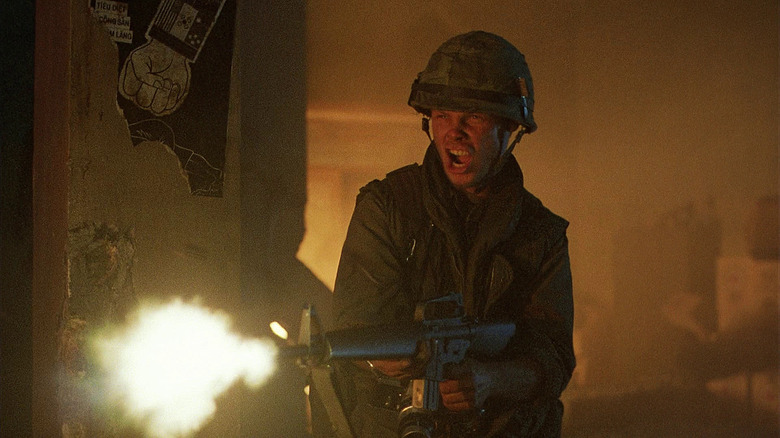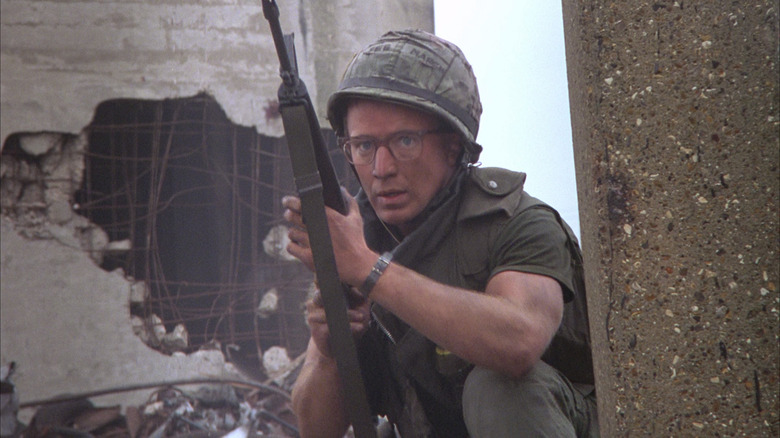Full Metal Jacket's Production Was Almost More Than A Nearly 60-Year-Old Stanley Kubrick Could Take
One might find that there are very few films that venerate and celebrate the Vietnam War (1955 – 1975). Filmmakers looked at the quagmire in Southeast Asia, and discovered no small amount of horrendous violence, idiotic governmental bluster, and soul-hollowing atrocities. Oliver Stone's "Platoon" won the Academy Award for Best Picture in 1986, and that film seemed like Hollywood's final exposé on the topic. The following year, however, Stanley Kubrick came in to deal a death blow to any and all films that seek to glorify war or venerate the soldier's experience with "Full Metal Jacket," a film so bitter, one might be tempted to call it a comedy.
"Full Metal Jacket" is a two-part drama. The first part of the movie takes place entirely during Marines basic training, overseen by Sgt. Hartman (R. Lee Ermey), the drill instructor from Hell. He screams, berates, insults, cusses, and hits the soldiers in his charge. He aims to condition them for combat — not make them better fighters, necessarily, but wipe out their consciences, to degrade them into murdering monsters. One solider played by Vincent D'Onofrio can't handle the abuse and is driven to the brink. One of his classmates, Joker (Mathhew Modine) carries the film into its second half, which depicts what happens when amoral, gun-toting young men are let loose into the free-for-all of combat.
No one is a good guy. No one is a hero. There is only death, killing, and degradation. Audiences may laugh, just to shake off Kubrick's bleak view of war.
In John Baxter's 1997 biography called simply "Stanley Kubrick: A Biography," several crew people recall that "Full Metal Jacket" was a tough film to make, largely because Kubrick, at age 60, was pushing himself too hard, and didn't always know what he was doing.
The wrong film speed
Interviewed for the book was John Ward, who — in the middle of production — had been hired to operate the film's Steadicam after the first camera operator had left. Ward recalls being struck by Kubrick's own lack of knowhow when it came to types of film and camera operation. By 1987, of course, the myth of Stanly Kubrick as a perfectionist had permeated Hollywood, and Ward had assumed that he would be working with a filmmaker possessing intimate and extensive knowledge of the craft.
Ward, instead, recalls an incident where Kubrick seemed to mix up the film speeds and filters that he wanted. In photography lingo, he mixed up 400 ASA with no standard 85 filter with using 640 ASA with a standard 85 filter. Only one of those options would give the direction the "authentic" war footage texture he sought. These are strange things for Kubrick to mix up, seeing as he himself began his professional life as a photographer.
Ward posited that the mix-up may have been a result of Kubrick's age. At 60, he was unable to do the all-night shoots of earlier in his career, and may have been running himself ragged. This was a battle-forward war picture with a lot of pyrotechnics and grueling 12-hour days. This would be a lot for anyone, much less a non-athletic filmmaker.
Getting across the field
Ward also recalled a scene where several of the film's amusingly named characters had to run across a battlefield, and Kubrick seemed unable to invent the appropriate blocking. It seems that Kubrick's mind simply wasn't on the project. As Ward said:
"[Kubrick would] come in in the morning knackered. In the scene where Cowboy and Eightball and the Doctor are pinned down and Joker doesn't know how to help them, Stanley was in the same position. He didn't know how to get them across this open space. It was in the script that Animal Mother took off with the M60 and they all had to chase after him, but how he started that process off, got it into their heads, wasn't clear. We shot the bit where they all blaze away at the side of the building five times."
Terry Needham, the first assistant director on "Full Metal Jacket," also remembered that the director was scattered and wasn't sticking to a schedule. As is common with a film set, the crew arrives long before the director to set up lighting, props, set dressing, and get everything ready for when the shooting begins. On at least one occasion, Needham remembers Kubrick arriving on the set and announcing that a different scene was to be shot that day.
These actions, to Needham's estimation, wasn't the filmmaker following a wild creative whim, but the actions of someone who wasn't paying attention to the schedule. When the director didn't see the right set, he left to have a meal. "[H]e was in his caravan," Needham recalls "with the Marks and Spencers sandwiches having a bit of shut-eye because he'd been up all night watching umpteen channels of television."
"Full Metal Jacket" was, it should be noted, Kubrick's penultimate film.


